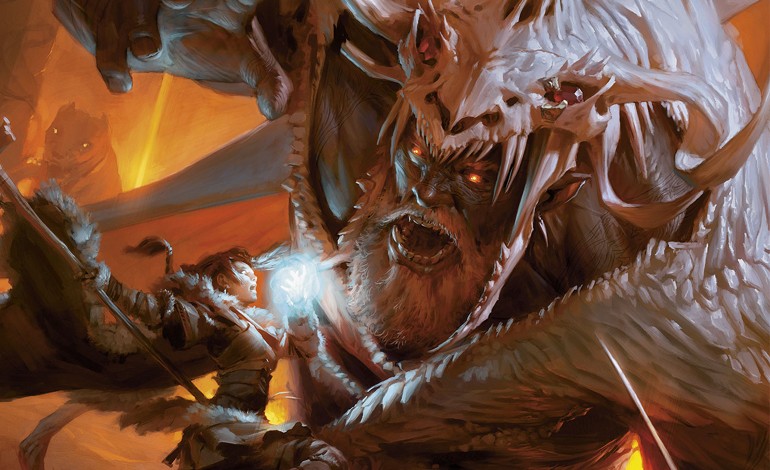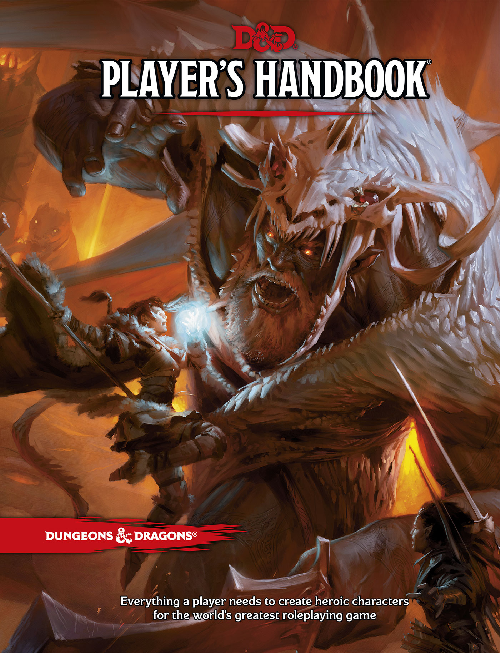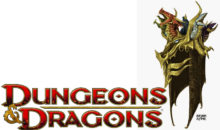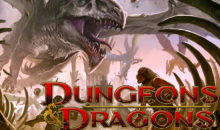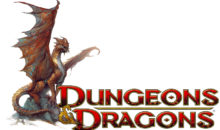Dungeons and Dragons Fifth Edition Player’s Handbook Review
So let’s talk about the Fifth Edition of Dungeons and Dragons. Well it doesn’t suck. In fact it’s actually quite good if you’re new to the game. The Player’s Handbook was released on August 19th 2014 by Wizards of the Coast after a multitude of playtests, convention appearances and the like.
Let me say some things before I start, there is literally no point to saying if this edition is better or worse than Pathfinder (the infamous retooling of 3.5 edition) or Fourth edition… maybe Fourth.
That’s because both of those lines have a long list of books designed to add and enhance the experience provided in the core products. Now, while the idea of the plucky underdog taking on the big kids of the yard might appeal to some the reality is that Pathfinder is too big to compare and Fourth Edition is too… well we don’t have the time for that. So it’s just not sane to make a statement about which is better.
That said let’s take a look at the Player’s Handbook.
It’s simple, but not in a way that’s insulting. The entire book carries the feeling of the classic 3/3.5 rules boiled down to their essentials and then given options or archetypes for the players to choose from and I’d be an idiot not to say that’s a smart move. Because it is.
With other RPG games there’s an emphasis on giving players several new abilities and bonuses at each and every level. The idea behind this is to give the player options on which of those bonuses they want to use. Instead of that, stat increases happen quite rarely but there are singular features that are given at new levels to make progressing feel like an expansion of tools rather than a vertical ladder climb. That’s nice and it’s a good smart move.
There is the addition of class archetypes as I mentioned before. With a normal archetype you might simply sub out one default ability for something an archetype would give you. Instead the idea is that an archetype is an add-on that exists in addition to your normal race or class.
There are a few minor new features which are nice but aren’t pervasive enough to be considered a radical new innovation. For example; some have praised how magic spells have the ability to increase in capacity as the player levels, however that’s only select spells and it is nice to see that happen in magic spells that don’t just do damage.
What I, as an older player liked best was the inclusion of the appendixes that had the explanation of the planes as well as the various gods contained within. It was a nice thing to see that included in the very first book. Beyond that, there isn’t much here for a player like myself. Despite the mechanical difference (which is more of an under the surface thing) you’ll still be playing the traditional RPG classes seen since the game began. If you already have an established system with your group of players then there isn’t enough here, especially in a first book, that will really make you want to switch. That is unless you are severely in need for a simple fantasy RPG that uses a conventional d20 based class system. That is a hell of a need though.
The book feels slim at 316 pages (including the index) but somehow as I browsed the pages my questions got answered. If players are expected to have a copy of this book it’s nice that it clocks in at around 30 bucks.
As for the bad? As I’ve said this is a simple game. Period. Even with the addition of a mandatory archetype choice at the start of the game as well as the use of background generators a level twenty character won’t have a large plethora of features or items to play with. On top of that skill rolls are boiled down to players only getting a couple of skills they can be good at and many modifiers are completely condensed into a few key areas.
But, let’s be honest, Dungeons and Dragons is the biggest, best known RPG in the yard. So much that it is synonymous with the term pen and paper RPGs. If this edition wasn’t a smart effort to be inclusive to inexperienced players in this age then it would be an act of suicide. Publishing suicide but suicide all the same.
So should you pick it up? Well in that respect I’ve never thought it was a good idea for players to start with a class based system. New players frequently have very broad ideas on what they want to be and a system that lets them pick thing without being bound in a class is a good way to go. That said if you want the traditional D&D experience without a lot of the more complicated rules I say this is a good place to start. But go get a look at the book yourself and see if you can make a good sense of the rules. The basic rules are here courtesy of Wizards of the Coast for players to check out and there’s a copy in most stores and such of the like. Give it a look and decide for yourself what you want in an RPG.

